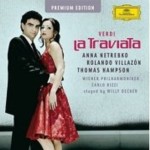Having practically waxed poetic recently about the Traviata from Madrid starring Norah Amsellem, I’m feeling a bit fickle: the one under consideration here, the hit of the 2005 Salzburg Festival, is the most moving performance of the opera I’ve ever come across. The setting and direction are not traditional–Willi Decker’s staging takes as its metaphor time and its passing, with death looming about, literally. A gray-bearded figure is almost omnipresent; he roams the stage quietly and slowly and can be seen by Violetta and occasionally by Alfredo. In the last act he takes the human form of Dr Grenvil, the announcer of Violetta’s oncoming demise.
The stage, backed by a huge semi-circular wall, is almost always empty of props except for one, two, or more sofas and a huge clock that sometimes moves in real time, more often whizzes forward and even goes backward. The red sofa of Act 1 goes with Violetta’s dress (the sets are by Wolfgang Gussman, the costumes by Gussman and Susana Mendoza); everyone else in the opera wears identical black suits, even the women. The two sofas in the first scene of the second act are covered in richly florid patterns (i.e., the countryside), and Violetta and Alfredo wear bathrobes that match the sofas. Alfredo sings “De’ miei bollenti spiriti” to Violetta as a sort-of high drama piece, and the two of them throw themselves around the sofas athletically. There is a great deal of physicality in Decker’s conception–these are young, active, sexy characters and their party-going buddies are always in for a rowdy good time.
Fear of Death is Violetta’s constant companion, so when she’s grasping at life, there’s a glorious desperation to her actions. Alfredo begins as a wimp, but sexual tension awakens him and he’s filled with self-assurance and life. The elder Germont is a bully–he and Alfredo come to blows at the end of their confrontation and Germont slaps Alfredo hard enough to floor him. Emotions run very high in this reading, and it all rings true.
Of course it would count for nil if the performances were not convincing, but they are, especially for the two leads, as fine as can be seen and heard at this time in operatic history. Anna Netrebko moves well, is physically beautiful and very sexy; she’s also petite enough to seem fragile, and her pout can register as true sadness. Her voice is richer than “first-act” Violettas, but she has the coloratura and the high D-flats to cope easily (she avoids the sometimes-interpolated E-flat at the close of “Sempre libera”). Her second act has great dignity and a reserve of power for “Amami, Alfredo”, and her vulnerability is deeply touching when she’s denounced by Alfredo. Her last act is beautiful and delicate, and we’ll overlook the fact that she flats on the pianissimo high As at the close of “Addio del passato”. She has not been overhyped–she’s superb.
The same can be said for Rolando Villazon, who brings out vocal niceties and nuances in Alfredo that I dare say I never knew existed; he’ll use unexpected dynamic changes or rubato or elide a note into the following word in a way that creates a personal stamp, a personal urgency, that makes the character come to life. And his essentially lyric tone has a burnished, dark quality that gives it real power.
Thomas Hampson’s Germont père is better than on the audio-only DG release (my guess is that several performances were taped and some went to audio, some to video, and parts to both) and he acts with authority (when he enters Flora’s party, he’s like the Commendatore in Don Giovanni), but the voice is frayed and the sound is not Verdian. The rest of the cast is good without being distinguished. Conductor Carlo Rizzi is lucky to have the leads he has. As always, he lacks imagination and has issues with stage/pit co-ordination; his tempos are fleet and Villazon and Netrebko are young and good enough to make magic out of them. He should thank them for covering his shallownesses.
The bonus CD contains a terrific film with commentary from the singers, Decker, and others, as well as excellent rehearsal footage. The sense of fun and adventure and creating something special is palpable. The picture and sound are superb; subtitles are in all European languages and Chinese. Even traditionalists–Zeffirelli fans and those who (rightly) admire the Covent Garden version under Solti (starring Gheorghiu)–will love this performance. Its honesty touches the heart and the stars shine gloriously. [6/28/2006]
































